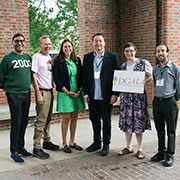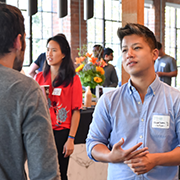Interviewing 101: An Interview with Hank Malin ’82
And the Impact of the Alumni Practice Interview Program

4 minute read
Celeste Gigliotti
4 minute read
Smile. Make eye contact. Detail your value, but don’t forget to sound humble. Ask good questions. And remember, you’re interviewing them, too!
The interview advice out there is endless and can seem especially daunting for new graduates. How can you sift through the noise and properly prepare for an interview? For Dartmouth alums, there’s a clear answer—the Alumni Practice Interview Program on Dartmouth Connect.
Developed by Dartmouth Alumni Relations and the Professional Development Committee of the Alumni Council, the program provides a means for members of the Dartmouth community to support one another as they prepare to interview for a job. Alums can sign up either as mentors, serving as the mock interviewer, or as mentees, serving as the mock interviewee.

Pro Tips for the Next Gen
Hank Malin ’82, a mentor for the Alumni Practice Interview Program since its inception, is no stranger to the interview. He estimates that he has conducted 4,000 interviews during the course of his career as an undergraduate and MBA admissions officer, as a recruiter and HR leader in business, and, most recently, as head of a college career center in Ohio.
“I felt like I’d seen a lot of good interviews, and a lot of a bad interviews,” he laughed. “So, I am able to coach pretty effectively what not to do.”
Interviewers like Malin are encouraged to approach the interviews as realistically as possible. They’re given an introductory packet detailing the content for the two required sessions and complete with a practice interviewing rubric and questions. Some interviewers though, like Malin, like to go above and beyond.
Malin's Process
- Step 1: Look to see if they have a LinkedIn profile. “I’m curious to see how they’re presenting themselves!”
- Step 2: Read their resume.
- Step 3: Reread the questions he’s going to ask. “I certainly have my favorites among those, because I like to make sure I’m getting at what’s most important to them, and also what they’re going to bring to their employer.”
- Step 4: Craft a few questions for the interview around a specific role, if that’s what the mentee is preparing for. “I look up that organization, if I don’t know it, to get a better sense of what they are about.”
- Step 5: Enter the Zoom in character. “There’s no chitchat about ‘now we’re going to start the interview’—because that’s not real.”
- Step 6: Conduct the 7–10 question interview.
- Step 7: Allow time for the mentees to ask questions at the end. “I’m not going to be able to answer the questions you ask me at the end of the mock interview, but I want to hear what questions you will ask. Those choices tell me a lot about an applicant.”
- Step 8: Debrief! Malin takes the time to dissect the questions they nailed and the questions they struggled with. He strives to help Dartmouth alums recognize the uniqueness of the Dartmouth experience, and they discuss how they can capitalize on that in interviews. He even explains what he, as an interviewer, is looking for: good storytelling, humility, a balance of confidence in what they can offer and an understanding that there’s still much to learn.
His biggest piece of advice? Be yourself. “You want them to hire you, not a fictional account of you. If you misrepresent skills you have, and you don’t have them, that’s a problem. But more importantly, you don’t want to sell your soul to be attractive to that employer if it’s not really the right place.”
He was pleased that many of his mentees have wanted to go beyond the interview and talk about other things career-related as well. They’ve talked about career paths, the work landscape, and what they should be hoping to get out of a job—even if it’s not a forever job.
“They really understand—which I thought was really impressive—that it’s about skills. If I can get skills from a job, that’s going to be really critical.”
Understanding the young alum mentality has been one perk of his interviewer experience. Malin has loved the chance to get to know the current generation of students at his alma mater. The mentor role has allowed him to understand what young alums are stressed about, what they’re striving to prepare for, and how he can lend his expertise to quell those fears.
And, on a fundamental level, it offers him the opportunity to reconnect with Dartmouth.
“I just think it’s a great way to give back, frankly,” said Malin. “And it’s a great way to use a skill that I think I have.”






